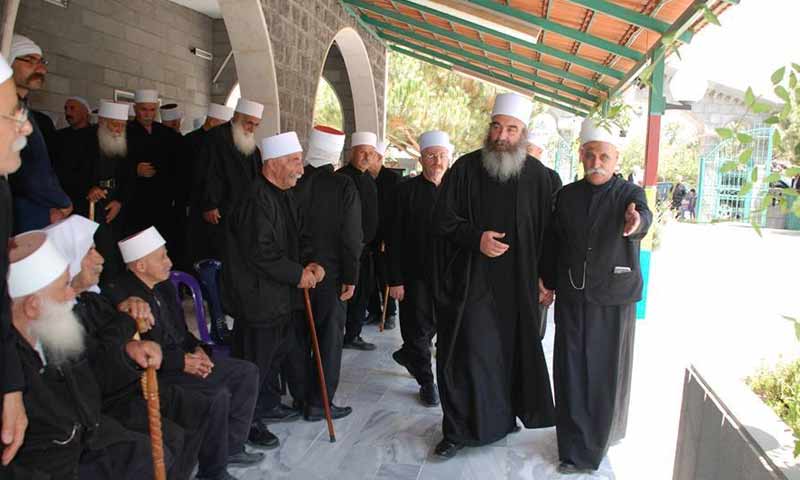



Enab Baladi – Daraa
Mutual kidnappings between the provinces of Daraa and As-Suwayda have left a harsh situation that affected the depth of social and economic ties, and led to a near break between the two provinces.
Residents fear to become victims of kidnappings and ransom demand, amounting in some cases to 20 million SYP, which led some to counter-kidnapping, as a means of pressure to release the kidnapped.
On November 22, 2019, physician Iskandar Abu Zidan was kidnapped from As-Suwayda province by an unknown part, and days later, his body was found dumped on the International Highway, near the village of Khirbet Ghazaleh, in the eastern countryside of Daraa.
Two days later, unidentified kidnappers abducted Dr. Anas Al-Hariri, a resident of Daraa, who works in the National Hospital in Suwayda. Despite his family’s appeal to elders and notables, he was only released after paying a ransom of 15 million Syrian Pounds.
Enab Baladi’s correspondents monitored the accident in Daraa and As-Suwayda. They revealed it is one of dozens of cases during the previous two years, which led to a social rift between the people of the two governorates.
Speaking to Enab Baladi, on condition of anonymity for social reasons, Abu Abdul Rahim, 35, from Daraa Governorate, said that he lived in As-Suwayda and enjoyed the hospitality of its people during his displacement from his town. Still, he decided to leave the province, after increasing cases of kidnapping, for fear of being another victim as the kidnappers are mostly unknown.
A community activist in As-Suwayda, who spoke on condition of anonymity for social reasons, believes that the generalization situation in the community plays a negative role, for example, if a gang from Daraa kidnapped a person from As-Suwayda, all the people of Daraa would be stigmatized, and vice versa.
Under geographical overlap, the two provinces witnessed prolonged trade and agricultural exchanges, which included most crops, livestock and local products, but the fear of being kidnapped limited this commercial exchange to avoid travelling and its risks.
According to Yassin Qaddah, a former employee of a humanitarian organization in Daraa, As-Suwayda was a significant source of goods and building materials when the opposition-controlled Daraa, and there were limited kidnappings, at the time, which increased dramatically after the regime took control of the southern region.
Walid Al-Rifa’i, a resident of the village of Umm Walad in the eastern Daraa countryside, pointed out that the situation stopped commercial exchanges, despite the geographical and social relations between the two governorates and most of the roads between them were closed.
As-Suwayda traders had a role in moving commercial activity, especially in the Hal markets, which had previously attracted most crops from Daraa. On the other hand, the demands of Daraa received As-Suwayda apples and mountain grapes, in addition to livestock trade between the two governorates.
Enab Baladi learned from a resident of Daraa countryside, who works in agricultural trade and who opted for anonymity for security reasons that As-Suwayda merchants are currently using the al-Hal market in Damascus instead of As-Suwayda.
According to Walid al-Rifai, from the Daraa governorate, Kidnappers are “gangs looking for financial gain” who were not influenced by the attempts of sheikhs and dignitaries or even the interference of the regime’s apparatus. These gangs are taking advantage of the tension occurring in the region, according to Yassin Kaddah, a former humanitarian worker.
Yassin believes that the regime is likewise benefiting from an increase in the rift between the two governorates, as it fears the involvement of As-Suwayda and Daraa in a peaceful and organized movement, especially after demonstrations in both provinces.
The former leader of the Free Syrian Army, Adham al-Kurd, wrote on his Facebook page that the kidnappings between Daraa and As-Suwayda “have the smell of intrigue and distraction. The way and timing suggest the hidden hands that serve its master,” referring to the Syrian regime’s role.
The community activist in As-Suwayda also pointed to the regime’s responsibility. He stressed that the Syrian government did not play any role in controlling these cases, while many did. He confirmed that the government is behind some of these operations, as a result of an interest obtained from the tension between the two governorates.
Many see that As-Suwayda Sheikhs and Daraa elders have a solution in their hands. The activist pointed out that gang control is out of their control, considering that the answer lies in activating trade exchange again to strengthen social ties, in addition to opening communication channels and holding seminars to bring the people of the two governorates together and relieve tension.
if you think the article contain wrong information or you have additional details Send Correction